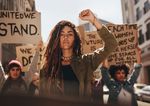THRONE SPEECH 2020 THE ONLY WAY FORWARD IS WITH A HUMAN RIGHTS APPROACH - fafia-afai
←
→
Page content transcription
If your browser does not render page correctly, please read the page content below
THRONE SPEECH 2020
THE ONLY WAY FORWARD IS WITH A HUMAN RIGHTS APPROACH
Summary
FAFIA welcomes the central commitment in the Throne Speech to address the multiple ways the
social and health crisis of COVID-19 has disproportionately impacted women in Canada, especially
Indigenous women, racialized women, Black women, newcomer women, 2SLGBTQ women, and
women living with disabilities. The Government's acknowledgment that the way out of the
COVID-19 crisis requires a feminist and intersectional approach is an important step towards the
future. A feminist recovery is not just an issue for women, but is vital to Canada's recovery as a whole.
For far too long economic and social structures in the hard fought social and political gains that women
Canada have failed to promote and realize women's have made – in the labour force and beyond – to be
equality. Though women have seen progress in their rolled back. FAFIA supports key commitments in the
civil and political rights to vote, stand for public office, Throne Speech, like the creation of a task force to
control property and to be equal before the law in guide the creation of the National Action Plan on
marriage and family life, they have not seen similar Women and the Economy, a national childcare
gains in their economic and social rights to an strategy, and the urgent development and
adequate standard of living, and to just and favourable implementation of a National Action Plan to respond
conditions of work. Women's social and economic to the National Inquiry on MMWIG. Now is the time
inequality has been heightened and exposed through for action, these commitments must move forward
the pandemic. We agree that Canada cannot permit tangibly, and the next step is the federal budget.
#FEMINISTTHRONESPEECH
1Context
Many of the foundations that were laid out in the Speech provide a clear path for a just recovery, but they require
a firm human rights framework to ensure the advancement of the rights of women in Canada. The impact of
COVID-19 on women - especially Indigenous women, racialized women, Black women, newcomer women,
2SLGBTQ women, and women living with disabilities - has been devastating and unique - laying bare
pre-existing inequalities requiring some systemic and structural changes. For Canada to fully recover, and
“build back better”, it's response to COVID-19 must be rooted in women's human rights. This response needs to
ensure that all women - especially Indigenous and racialized women, and women with disabilities - in Canada
are finally able to fully enjoy their economic, social and cultural rights.
Recommendations
We welcome the explicit recognition of the need
The speech focuses on job creation, but any
for a feminist intersectional approach to the reform to ease the economic insecurity that women
economic recovery process and the efforts to build a experience must employ a comprehensive analysis
task force with diverse representation. Women's using an equality framework. This is essential
inclusion is critical to a just and feminist COVID because women who work in female dominated
recovery for all of Canada, but it is not an end in industries are often undervalued and
itself. Economic recovery is undoubtedly a under-compensated. Women in Canada do not have
significant aspect of this process, but solely relying strong legal guarantees of pay equity that is
on it will not lead to meaningful change. proactive, effectively enforced, and covers both the
public and private sectors in all jurisdictions. Canada
has not yet taken women's wage gap seriously or
For this task force to be effective it must: viewed it as a human rights issue compelling
- Be directly linked to decision-making bodies either attention by all governments.
directly reporting to the Prime Minister's Office or the
Ministry of Finance and Treasury Board Secretariat;
Protective and equality-ensuring measures must
be in place to ensure that good quality jobs are
- Engage with the implementation of social and created for women in all sectors, including in the
economic rights of women; care-giving sector where women predominate.
Governments have permitted the market to override
- Be transparent in the selection of participants, as legal and moral commitments to equality for
well in its procedures, and engagement processes; women, thereby putting all of us in danger.
COVID-19 has highlighted long existing exploitation
- Involve regular participation of the multi-sector
of women, particularly immigrant, racialized
groups working to protect the women's rights;
women who are underpaid, under protected, and at
- Engage with organisations that represent the high risk. There are no adequate measures in place
diverse voices from across the country including to protect and provide equality for women in
grassroots organisations, Indigenous women, "women's jobs", including those in the health sector
racialized women, Black women, Newcomer women, and in the retail sector. This is the time to provide an
2SLGBTQ women, and women living with disabilities. adequate standard of living for women, free from
income insecurity.
#FEMINISTTHRONESPEECH
2WOMEN AND EMPLOYMENT 1
• 90% of paid long-term care home staff are women2;
• 56% of women are employed in the Canadian retail
and service sectors3;
• 42% of personal support workers are racialized4.
• Immigrant women represented 37.4% employment losses by mid-June5.
FAFIA celebrates the commitment to a national
FAFIA appreciates the dedicated funding towards
affordable, accessible, inclusive and high-quality housing and the commitment to implement the
childcare system, a long-term demand of the National Housing strategy – the right to adequate
feminist movement in Canada. Childcare is a housing is an explicit international human right of
delayed recommendation lasting 50 years, having every Canadian and must be reflected in
been recommended by the Royal Commission on Government action. However, implementation
the Status of Women in 1970. This again needs to be strategies also need to include collaboration with
implemented in collaboration with the advocates experts in women's housing and homelessness, and
and organizations who have been leading this fight. data collection that reflects the unique
circumstances and needs of women. Any
The Government must accelerate the development commitment to end chronic homelessness requires
and implementation of a National Action Plan that a commitment to take into account the hidden
responds to the National Inquiry into Missing and homelessness that women experience.
Murdered Indigenous Women and Girls. Experts who have highlighted the long-term impact
The Government needs to expeditiously implement of the financialization of housing must be brought
Bill S3 by ensuring that all First Nations women and in to examine the impact of the market economy on
their descendants who are now entitled to status low income women. Finally, applying a human rights
under the Indian Act, and its benefits, can actually be framework to the implementation of housing
registered. To do this, Indian Act registration must be programs provides a more comprehensive approach
declared an essential service. FAFIA echoes the calls that is aimed at achieving substantive equality for
from Indigenous women's organizations, including the women and built around affordability and
Ontario Native Women's Association (ONWA), that adequacy, including the realities of women living in
this work, and all work impacting Indigenous women's remote and Northern communities.
lives, must include Indigenous women and Indigenous
women's organizations at the decision-making tables.
1
There is a significant lack of disaggregated data to provide a comprehensive picture of women and employment, these statistics have been chosen to highlight the disparities that exist.
2
Carole A Estabrooks & Janice Keefe, “COVID-19 Crisis in Nursing Homes is a Gender Crisis”, Policy Options (19 May 2020), online:
.
3
See “Female employment, by occupation”, Statistics Canada (2015), online: .
4
YWCA Canada and the Institute for Gender and the Economy, A Feminist Economic Recovery Plan for Canada: Making the Economy Work for Everyone, online:
5
Kathrine Scott, “Tracking women's economic recovery”, Behind the Numbers, online:
#FEMINISTTHRONESPEECH
3The commitment to reform Employment FAFIA applauds the commitment to work
Insurance (EI) is welcome and long overdue. The towards new, national standards for long-term
existing eligibility criteria disqualify many workers care, something that we have called for over many
who pay into the system from collecting benefits, years. However, these standards must take into
and the exclusions fall especially heavily on
women. Women's human rights advocates must be in long term care homes including personal
full participants in the reform process to ensure that support workers are racialized women. COVID-19
systemic discrimination against women is has highlighted the increased risks these essential
eliminated and EI is returned to its role of supporting workers face.
all unemployed workers.
The Government's acknowledgement of systemic
racism in Canada in the speech was long awaited.
The speech recommended police training and
reform signalling a limited approach when a much
more radical overhaul of policing and the criminal
justice system are needed given systemic and
deep-rooted racism. There must be a commitment
to work with the voices from the community who
have lived experience in addition to expertise on
ways to combat racism. A radical overhaul of
policing and the criminal justice system in Canada
is also needed to address systemic sexism, overt INDIGENOUS WOMEN ARE
police brutality and abuse of women, and failures DISPROPORTIONATELY INCARCERATED
to protect and provide justice to women who are
victims of male violence. • Indigenous women are dramatically
over-represented in the federal prison system -
6 "Indigenous People in Federal Custody Surpasses 30% - Correctional Investigator Issues they account for 42% of women in custody,
. but only 4% of Canadian women6.
The way forward
Ensuring a just and feminist recovery is not just a women's issue, but central to Canada's recovery.
The speech addressed the concerns of women to the extent that it laid out the foundations for
“building back better”. We celebrate the Government's commitment in principle to hear from the
people in Canada - and in particular women and feminist experts - but look forward to concrete
implementation that will fulfil Canada's human rights obligations. Women in Canada have waited
long enough for realization of their human rights. We are seeking comprehensive plans with
timelines for delivery. We are eager to see the budget. We want full implementation of the
promises made to women internationally, domestically and now in the Throne Speech.
#FEMINISTTHRONESPEECH
4You can also read



























































